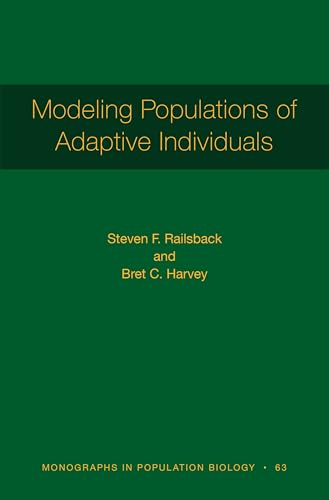
Sinossi
Ecologists now recognize that the dynamics of populations, communities, and ecosystems are strongly affected by adaptive individual behaviors. Yet until now, we have lacked effective and flexible methods for modeling such dynamics. Traditional ecological models become impractical with the inclusion of behavior, and the optimization approaches of behavioral ecology cannot be used when future conditions are unpredictable due to feedbacks from the behavior of other individuals. This book provides a comprehensive introduction to state- and prediction-based theory, or SPT, a powerful new approach to modeling trade-off behaviors in contexts such as individual-based population models where feedbacks and variability make optimization impossible.
Modeling Populations of Adaptive Individuals features a wealth of examples that range from highly simplified behavior models to complex population models in which individuals make adaptive trade-off decisions about habitat and activity selection in highly heterogeneous environments. Steven Railsback and Bret Harvey explain how SPT builds on key concepts from the state-based dynamic modeling theory of behavioral ecology, and how it combines explicit predictions of future conditions with approximations of a fitness measure to represent how individuals make good—not optimal—decisions that they revise as conditions change. The resulting models are realistic, testable, adaptable, and invaluable for answering fundamental questions in ecology and forecasting ecological outcomes of real-world scenarios.
Le informazioni nella sezione "Riassunto" possono far riferimento a edizioni diverse di questo titolo.
Informazioni sull?autore
Steven F. Railsback is adjunct professor of mathematics at Humboldt State University and a consulting ecologist. His books include Individual-based Modeling and Ecology and Agent-Based and Individual-Based Modeling (both Princeton). Bret C. Harvey is an aquatic ecologist with the US Forest Service and adjunct professor of fisheries biology at Humboldt State.
Le informazioni nella sezione "Su questo libro" possono far riferimento a edizioni diverse di questo titolo.
Altre edizioni note dello stesso titolo
Risultati della ricerca per Modeling Populations of Adaptive Individuals
Modeling Populations of Adaptive Individuals
Da: PBShop.store UK, Fairford, GLOS, Regno Unito
HRD. Condizione: New. New Book. Shipped from UK. Established seller since 2000. Codice articolo WP-9780691180496
Compra nuovo
Quantità: 1 disponibili
Modeling Populations of Adaptive Individuals
Da: GreatBookPrices, Columbia, MD, U.S.A.
Condizione: New. Codice articolo 38642579-n
Compra nuovo
Quantità: 1 disponibili
Modeling Populations of Adaptive Individuals
Da: GreatBookPrices, Columbia, MD, U.S.A.
Condizione: As New. Unread book in perfect condition. Codice articolo 38642579
Compra usato
Quantità: 1 disponibili
Modeling Populations of Adaptive Individuals
Da: Kennys Bookshop and Art Galleries Ltd., Galway, GY, Irlanda
Condizione: New. 2020. Hardcover. . . . . . Codice articolo V9780691180496
Compra nuovo
Quantità: 1 disponibili
Modeling Populations of Adaptive Individuals
Da: GreatBookPricesUK, Woodford Green, Regno Unito
Condizione: As New. Unread book in perfect condition. Codice articolo 38642579
Compra usato
Quantità: 1 disponibili
Modeling Populations of Adaptive Individuals (Monographs in Population Biology, 63)
Da: Lucky's Textbooks, Dallas, TX, U.S.A.
Condizione: New. Codice articolo ABLIING23Feb2416190103452
Compra nuovo
Quantità: Più di 20 disponibili
Modeling Populations of Adaptive Individuals
Da: GreatBookPricesUK, Woodford Green, Regno Unito
Condizione: New. Codice articolo 38642579-n
Compra nuovo
Quantità: 1 disponibili
Modeling Populations of Adaptive Individuals
Da: THE SAINT BOOKSTORE, Southport, Regno Unito
Hardback. Condizione: New. New copy - Usually dispatched within 4 working days. 454. Codice articolo B9780691180496
Compra nuovo
Quantità: 1 disponibili
Modeling Populations of Adaptive Individuals
Da: Kennys Bookstore, Olney, MD, U.S.A.
Condizione: New. 2020. Hardcover. . . . . . Books ship from the US and Ireland. Codice articolo V9780691180496
Compra nuovo
Quantità: 1 disponibili
Modeling Populations of Adaptive Individuals
Da: Rarewaves USA, OSWEGO, IL, U.S.A.
Hardback. Condizione: New. Ecologists now recognize that the dynamics of populations, communities, and ecosystems are strongly affected by adaptive individual behaviors. Yet until now, we have lacked effective and flexible methods for modeling such dynamics. Traditional ecological models become impractical with the inclusion of behavior, and the optimization approaches of behavioral ecology cannot be used when future conditions are unpredictable due to feedbacks from the behavior of other individuals. This book provides a comprehensive introduction to state- and prediction-based theory, or SPT, a powerful new approach to modeling trade-off behaviors in contexts such as individual-based population models where feedbacks and variability make optimization impossible.Modeling Populations of Adaptive Individuals features a wealth of examples that range from highly simplified behavior models to complex population models in which individuals make adaptive trade-off decisions about habitat and activity selection in highly heterogeneous environments. Steven Railsback and Bret Harvey explain how SPT builds on key concepts from the state-based dynamic modeling theory of behavioral ecology, and how it combines explicit predictions of future conditions with approximations of a fitness measure to represent how individuals make good-not optimal-decisions that they revise as conditions change. The resulting models are realistic, testable, adaptable, and invaluable for answering fundamental questions in ecology and forecasting ecological outcomes of real-world scenarios. Codice articolo LU-9780691180496
Compra nuovo
Quantità: Più di 20 disponibili

